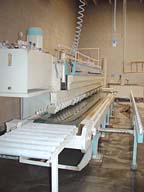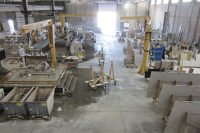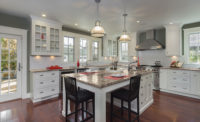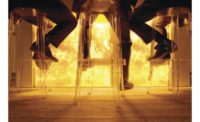
When Caesarstone's founders started a company for quartz surfaces in Israel in 1987, they had a vision of creating surfaces that would retain the beauty and vitality of polished natural stone, even after many years of intensive use. By adding quartz, one of nature's hardest materials, to the existing Bretonstone process for engineered stone, the company is able to create slabs with optimal physical properties. The first Caesarstone quartz surface was shipped out in 1987.
From its base in Israel, Caesarstone's distributor base expanded from Denmark, where its first independent distributor was located, to include distributors in Europe, North America, South Africa and Australia. And to support growing demand for its products, a second press was added in August 2002.
All of Caesarstone's material is produced at the company's manufacturing facility in Kibbutz Sdot-Yam, Israel. Using two presses, the manufacturing facility can produce up to 1 million square meters in 3-cm, 2-cm and 1-cm product per year. Servicing all of its markets, Caesarstone offers over 70 different design patterns in both polished and honed finishes.
The quartz surfaces are available in sizes that are ideal for kitchen, counter and vanity tops. Slabs measure 122 x 53 inches (310 x 135 cm) or 122 x 551â„2 inches (310 x 141 cm) with thickness options of 3â„4 or 1 1â„4 inches (20 or 30 mm).

Manufacturing process
The Caesarstone manufacturing process begins with pure, natural quartz aggregates. The aggregates are combined with polyester resins and pigments through a patented system of vacuum vibro-compaction, resulting in a unique solid material. Caesarstone products and plant procedures were approved by the International Quality Network and awarded the ISO 9002 emblem. This guarantees that operations and quality management are performed according to strict ISO 9002 procedures, the company reports. New technology also brought about more of a consistent cure for improved surface consistency.Breaking down the product by components, Caesarstone is composed of 93% natural quartz aggregates, and 6% pigments and polyester resins. The hardness of quartz is what gives Caesarstone products their strength and durability, according to the company.
Once the slabs have hardened, they are processed much in the same fashion as natural stone slabs. A multi-head slab polishing unit from Breton is used to hone or polish the slabs as required, and all slabs are subjected to rigorous quality control procedures prior to acceptance.
Marketing
The physical properties of Caesarstone are ideal for a wide range of interior commercial and residential applications, including those subject to high traffic and heavy use. Common Caesarstone applications include kitchen countertops, vanity tops, interior cladding, fireplace surrounds and furniture pieces. The product is non-porous and highly stain, scratch and heat resistant, thus making it virtually maintenance-free, according to Caesarstone.The principal products offered in the North America market include 36 standard items in a width of 53 and 55 1â„2 inches. Thicknesses of 3 cm and 2 cm are stocked in the U.S., and a 1-cm thickness is available by factory order. Finishes include polished and honed in four “Limestone†series.
Caesarstone's markets include residential kitchen and bath dealers, builders and commercial architects and designers. Currently, the residential market comprises 60% of total sales, with builders representing 30% and the commercial trade representing 10%.
Material is sold through a network of independent distributors throughout North America. Distributors sell to a network of fabricators located in their specific market area, and they are also responsible for local promotion and marketing efforts.
Caesarstone's “Fabricator Network†of processors is comprised of 70% stone fabricators and 30% solid surface fabricators. “Additionally, many solid surface fabricators just measure and install due to the capital investment required for stone fabrication equipment,†the company stated. According to the company, the technical qualities of Caesarstone require no rodding, and allow for tight seams.
Material is imported from Israel via container loads, with six- to eight-week service. The company is supported by warehouses in Sun Valley, CA, and Nashville, TN, and further supported by local market distributors holding stock.
End box
Type of work: Engineered quartz stone in slabs and custom architectural piecesMachinery: Bretonstone system for slab production, Breton multi-head polishing line, Kolb bridge saws, automated edging equipment
Production rate: 1 million square meters per year


